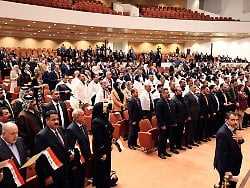Sunday, January 09, 2022
Meeting leader in the hospital
Tumult at the opening of parliament in Baghdad
After months of disputes over the outcome of the election in Iraq, the parliament is constituted. But already in the first meeting there was a riot, the chairman of the meeting had to go to the hospital. A Shiite alliance with backing in Iran does not want to accept its own electoral defeat again.
Three months after the election in Iraq, the parliament in Baghdad met for its constituent session. The meeting reportedly sank into chaos after representatives of two rival Shiite movements broke out over the majority. The head of the opening session had to be hospitalized, according to the state television broadcaster Irakija.
According to Kurdish MP Muthana Amin, the opening session began “normally with the swearing-in” of the 329 MPs. But then a Shiite alliance led by the political arm of the pro-Iranian Hashd al-Shababi network to be the largest alliance in parliament with 88 seats. This led to a heated argument with the movement of the Shiite cleric Moktada Sadr, which emerged as the strongest force in the October 10 election with 73 seats.
When Mahmud al-Mashhadani, who was the oldest member of parliament at the meeting, asked for the information to be checked, he was “insulted and attacked by members,” Amin told the AFP news agency. According to another representative of parliament, Mashhadani lost consciousness. He was hospitalized, but according to the INA news agency, his condition is “stable”. It was initially unclear whether he was injured in the attack or if there was some other reason for his collapse. After a one-hour break, the meeting continued.
Shiite movement with a strong militia
Parliament now has to elect its chairman, who is traditionally a Sunni Muslim. Parliament then has to appoint a new president within 30 days, who in turn appoints the head of government at the suggestion of the largest bloc. The Prime Minister, traditionally a Shiite Muslim, then has another 30 days to form a government.
Sadr, however, had already campaigned for an end to the previous system, according to which the offices were assigned strictly according to religious and ethnic proportionality. In order to achieve this, he said he could enter into an alliance with two Sunni and one Kurdish party, so that the majority in parliament and the head of government and cabinet from among their number.
However, it is questionable whether Sadr will succeed in this. It is true that the political arm of the Shiite Hashd al-Schaabi network lost a lot in the election and only has 17 members. Yet the rival of Sadr’s movement remains a key player in Iraq. Its militias have over 160,000 fighters, and the network is backed by Tehran.
Demonstrations against alleged electoral fraud
After the elections there were violent protests by Hashd supporters. The network also made the – ultimately unsuccessful – attempt to have the election canceled because of alleged “fraud”. These actions show how much resistance the network is to its loss of power.
The proportional representation system is intended to guarantee the political participation of all ethnic and religious groups in the country. It was introduced after a US-led military coalition overthrew Iraqi ruler Saddam Hussein in 2003. However, many Iraqis now see the proportional representation system as the main reason for the rampant corruption in the country.
